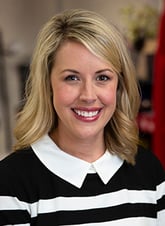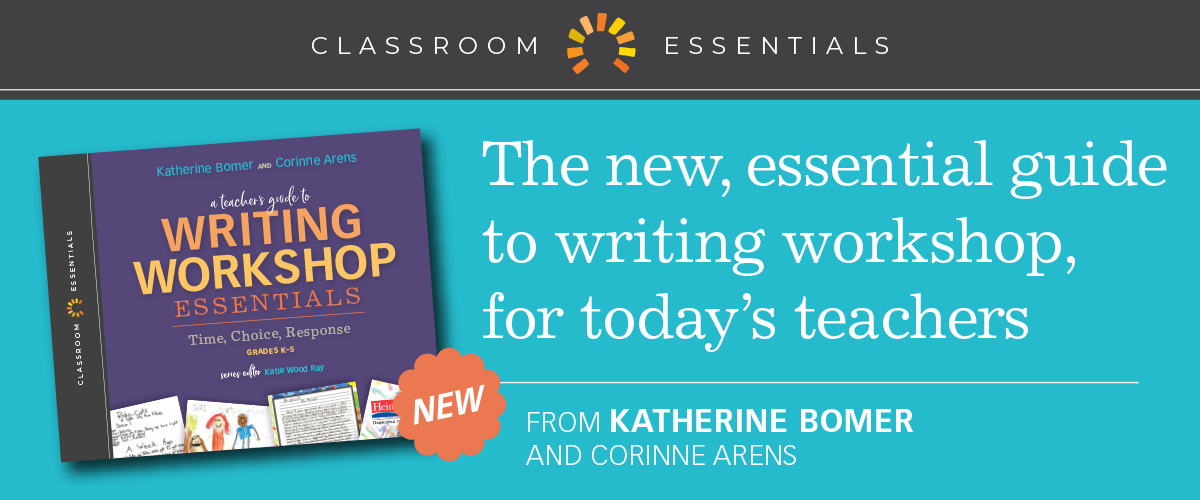.png?width=780&name=Bomer%20Arens%20Response%20BLog%20(1).png)
The ability to give and receive constructive criticism is a valuable life skill, but are we ever taught how to effectively do it? Sharing a draft of writing can make one feel vulnerable and insecure but learning how to graciously offer and receive constructive feedback allows us all to move forward as writers.
In Part III of A Teacher's Guide to Writing Workshop Essentials: Time, Choice, And Response, Katherine Bomer and Corinne Arens offer structures and routines for how to teach children to give-and-take a response to writing. below is a glimpse at what the authors suggest:
Make Feedback More Specific
Stopping at “I love it!” or “Add more details” does not give a writer a vision for what they can do, or need to do more of, in the future. Instead, students need to watch and listen for what sparks their reader’s interest and excitement as they talk about their writing, and then name it specifically. Students need to know that how they say things matters and that the tone of their feedback should always be generous and supportive.
Respond in Different Ways
When students don’t have a lot of experience talking as writers, they tend to be too general in the give-and-take of response. “Do you like it?” a writer will ask. “Yes, it’s great!” they hear in response. To help them become more resourceful and specific, teach students that there are different types of specific response. For example, a reader can respond as a collaborator, critic, or editor. In a single working session, a good partner moves in and out of different response styles based on what the writer needs and where the conversation goes.
Ask for Specific Help as a Writer
The more students learn about different kinds of responses, the better they will be able to advocate for their own needs as writers—but don’t leave this learning to chance. Teach students how to articulate a specific need and then how to ask for help to address it. Teach your students how to dig deeper with questions.
What To Do with Response?
It can be difficult for writers (of any age) to open themselves to feedback. Some become defensive, some feel embarrassed that they perhaps did something wrong. Students can learn specific steps that can help them see that writers often learn new things from others who read their work and come to know the writing will be even better with feedback.
When students receive response throughout the process of writing, they learn that revision is just a natural part of writing and they need not fear it or try to avoid it. In fact, revision is part of life, isn’t it? Imagine if we couldn’t tweak our appearance, change our minds, or improve our behaviors. Learning how to give compassionate response and process helpful critique also teaches us how to be in a relationship with others. It teaches us how to speak with kindness and without judgment.
…
The above has been adapted from A Teacher's Guide to Writing Workshop Essentials: Time Choice and Response, a part of the Classroom Essentials Series.
Listen to the podcast episode where Heinemann author and Classroom Essentials Series editor Katie Wood Ray talks with Katherine Bomer and Corinne Arens about the core principles that make for a good writing workshop.
 Follow us on Instagram @heinemannpub to stay up to date on the latest books, your favorite authors, and upcoming events!
Follow us on Instagram @heinemannpub to stay up to date on the latest books, your favorite authors, and upcoming events!
 Katherine Bomer, author of The Journey Is Everything, Hidden Gems, and Starting with What Students Do Best, is one of the field’s most gifted writers as well as one of its most gifted teachers of writing. In more than two decades of teaching and consulting, she has used her writers’ eye to focus on how craft isn’t just an instructional goal but an instructional tool that allows writers to grow well beyond the range of most publicly available assessments. An internationally-known consultant and frequent keynote speaker, Katherine began her consulting career with the Teachers College Reading and Writing Project. In addition to Writing a Life, she is the coauthor of the Heinemann title For a Better World (with Randy Bomer) and delivers on-site PD through Heinemann Professional Development Services.
Katherine Bomer, author of The Journey Is Everything, Hidden Gems, and Starting with What Students Do Best, is one of the field’s most gifted writers as well as one of its most gifted teachers of writing. In more than two decades of teaching and consulting, she has used her writers’ eye to focus on how craft isn’t just an instructional goal but an instructional tool that allows writers to grow well beyond the range of most publicly available assessments. An internationally-known consultant and frequent keynote speaker, Katherine began her consulting career with the Teachers College Reading and Writing Project. In addition to Writing a Life, she is the coauthor of the Heinemann title For a Better World (with Randy Bomer) and delivers on-site PD through Heinemann Professional Development Services.
A published poet and essayist, Katherine is also coauthor (with Lucy Calkins) of A Writer’s Shelf. She began over fifteen years ago as a professional developer with the Teachers College Reading and Writing Project. A classroom teacher for ten years, she now works with teachers in elementary and middle schools throughout the country. As a frequent speaker at conferences and institutes, she combines a teacher’s practical advice, a writer’s love of language, and a powerful plea for social justice.
 Corinne Arens, Ed.D., is a district-level Instructional Coach for Writing in the Blue Spring School District, Blue Springs, Missouri. She is a teacher consultant for the Greater Kansas City Writing Project and has served on multiple state-level committees.
Corinne Arens, Ed.D., is a district-level Instructional Coach for Writing in the Blue Spring School District, Blue Springs, Missouri. She is a teacher consultant for the Greater Kansas City Writing Project and has served on multiple state-level committees.





